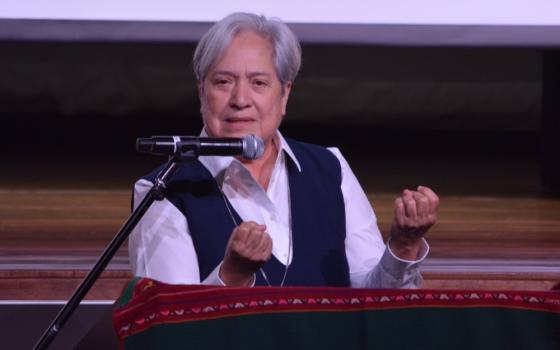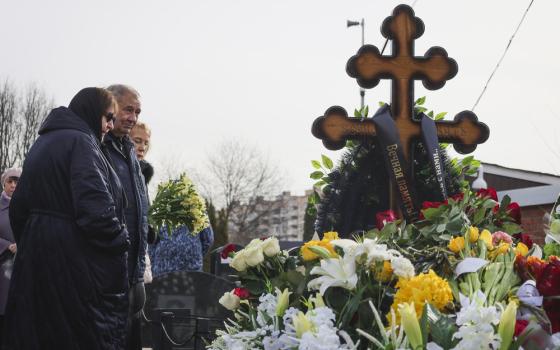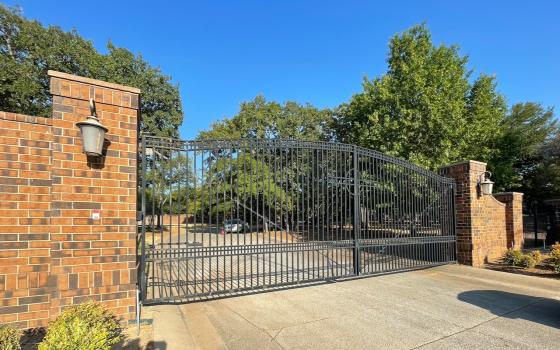
DELES Training and Education on HIV/AIDS
Enugu, Enugu State, and Ibadan, Oyo State, Nigeria
ENUGU, ENUGU STATE, NIGERIA
DELES is an acronym for "Development Education and Leadership Services." It is a not-for-profit, non-governmental Nigerian organization that began at a time when the Nigerian Catholic Church was eager to get the faithful involved in pastoral work.
Two sisters of the Missionary Sisters of Our Lady of the Apostles work full-time as DELES staff. One serves as the area manager of the Ibadan DELES Resource Center and coordinator of the HIVAIDS Awareness Education Program. The other works full-time in a similar role in the northern zone of Nigeria. A third sister works part-time in the education programs.
The DELES Program for Institutional capacity building and HIV/AIDS awareness has been operating in Nigeria since 1983. It was designed to promote integral human development, behavior change and anti-HIV/AIDS clubs in schools. Using an educational model, it aims to teach youth how to be leaders among their peers. Youth in two cities: Ibadan in the state of Oyo and Enugu in the state of Enugu are the beneficiaries of the project herein described.
The Nigerian People
Gaining its independence in 1960, Nigeria has continued to struggle toward authentic democratic governance. Military coups have delayed the process as have elected officials who have used their position for personal gain. Though rich in resources, its economy has been strained by a foreign debt of over $30 billion. It is estimated that 70% of Nigerians are poor, the majority of those being women.
Rights violations are common in Nigeria. Women in general, and widows in particular, are treated unjustly. Having limited opportunity for education they find themselves unemployed or employed in low-paying jobs. Domestic violence is common and Sharia law (a law governing Muslim life) is practiced against women in northern Nigerian states. As the number of poor increases, HIV/AIDS is fast becoming the primary cause of death. Women turn to prostitution as a way to survive. Sex trade syndicates lure young women to Italy and other European countries under the pretence of employ-ment. Whenever possible, youth leave the country draining it of human resources needed for valuable change.
The intent of the DELES Training and Education Project for HIV/AIDS prevention was to create awareness of HIV/AIDS among Nigerian youth in selected secondary schools in Nigeria. The students who participated in the training became primary health educators specially trained to reach the overall student population.
The DELES Training and Education Project on HIVAIDS
The DELES method of training used for this project involved the use of Dr. Paulo Freire's psychosocial method which is people-centered and concentrates entirely on the social environment of the students. Understanding the social reality in which they live was a fundamental part of the students' learning experience.
The schools selected for this project are located in the cities of Enugu and Ibadan. Most of the youth in these cities have become disillusioned with their social situation due to their faulty perception of life as a restless pursuance of material things. The general outlook of these young people can be described in three ways: marginalization, disengagement, and disorientation.
- The Enugu area is dominated by tribal groups who claim to be politically marginalized. The average boy who sees himself as "disadvantaged," fends for himself and sees schooling as an unprofitable waste of time because it does not provide employment. He prefers to work as an apprenticed trader rather than attend school. Owning his own "motor spare parts" shop or drug/electronics store becomes his major goal in life. Hence, these young men end up illiterate with enough money to lure the younger boys out of school.
- The Ibadan area can be characterized by "hawking" (carrying goods for sale) which is their distraction from school. Young girls make friends with their male customers and eventually shy away from hawking fruits and nuts to hawking their mature bodies by taking to prostitution. These young women eventually drop out of school either as a result of unexpected pregnancy or inability to cope with academic demands, and enter into full-time prostitution within and outside Nigeria.
A study by the National HIV Sero-Prevalence Sentinel Survey in 2003 found that women (ages 15 to 24) in primary and secondary levels of education were at higher risk for exposure to HIV/AIDS. This indicated a need to focus efforts for HIV/AIDS prevention on girls within schools. Activities designed to empower young women to protect themselves from HIV/AIDS infection were, therefore, adopted as a strategy to address this issue.
The DELES training model was adapted to training peer educators in the schools through the use of facilitative techniques such as role-play, case studies, group exercises, and plenary group discus-sions. This approach elicited student interest and enabled the students, themselves, to discover the causes, effects and solutions of HIV/AIDS. To this end, the training model was designed to achieve the following outcomes:
Phase One Outcomes:
- Personal discovery and personal growth
- Listening and communication skills
- A sense of self worth and respect for others
- Leadership skills
- Team building skills
- Skills in identifying needs and mobilizing others for action
- Basic facilitation skills
- Ability to relate religious values to life
- Action plan for implementing what was learned
Phase two Outcomes:
- Evaluation of Phase One Action Plan
- Skills in identifying needs and mobilizing others for action
- Basic facilitation skills
- Integral community development skills
- Identification of potential facilitators
- Ability to relate religious values to life
- Action plan for implementing what was learned
Gaining approval from the relevant government bureaucracies, especially the Ministry of Education, was a challenging task. Once approval was obtained, plans for the program were finalized.
Procedures for Conducting the Workshops
The schools identified for the training program were randomly selected based on the following criteria:
- Mixed religion and gender
- Ages 14 to 21
- Drawn from the three upper classes in senior secondary schools
All the senior secondary students volunteered to participate in the after school workshops. Although the schools were requested to send 15 students each, between 30-40 students from each school participated.
Resource people for the workshops included: three facilitators who were DELES staff members, a government staff member from the HIV/AIDS zonal office, and a medical doctor who was also a researcher. Workshops were scheduled from 2:00 pm to 6:00 pm:
- 142 students, from four Enugu area schools, met at one school site on March 13-14, 2003.
- 120 students, from four Idaban area schools, met at two school sites: approximately half the group met at one site on April 6-7, 2003, and the other group met on April 8-9, 2003.
Day one of the workshop:
On the first day of the workshops, staff members welcomed and introduced the students from the participating schools. The students were then divided into mixed groups to discuss:
- What they already knew about HIV/AIDS
- How HIV/AIDS is and is not transmitted
The results of the small group discussions were then shared with the general group. After a short break, the medical doctor presented a detailed lecture on the HIV/AIDS pandemic and discussed the following using a poster kit to illustrate her comments:
- A thorough understanding of HIV/AIDS
- Implications of the spread of HIV/AIDS based on statistical data
- The need for behavioral change
At the end of this first day, questions were raised by the students to help clarify concepts not easily understood.
Day two of the workshop:
Day two began with a recap of the previous day's activities. The government staff person from the HIV/AIDS zonal office then presented a second talk on HIV/AIDS focusing on infection and the need to sensitize others.
The students again met in mixed groups to discuss and plan a dramatization for the larger group which highlighted the following:
- How HIV/AIDS is spread
- The effect of stigmatization
- How an HIV/AIDS victim should be treated with care and support
Participants from each school then developed a plan for forming a Peer Health Education and Anti-Aids Club for their respective schools. After the plans were approved and reported to the large group, training kits and materials were distributed to each of the schools.
Success Factors Observed
As a result of the training, the respective schools established anti-AIDS clubs and educated the students through presentations at school assemblies, distribution of handbills and souvenir materials, organized "True Love Wins" campaigns, and counseling activities provided by the Peer Health Educators. The students' willingness to volunteer for the training, and the teachers' cooperation by accompanying the students and actively participating in the program, played a significant role in its overall success.
A grant from the Conrad N. Hilton Fund for Sisters was particularly helpful for achieving success. It was a key factor in facilitating the mobilization and transportation of the students from the various schools. An additional grant, in 2003, was used to purchase technology equipment which helped to make the program even more efficient and professional.
A large number of schools and young people have yet to be reached. Many of the DELES graduates continue to introduce the program in churches and other groups to recruit new candidates for the training that goes on in schools and parishes. External monitors evaluate the impact of the HIV/AIDS training. They include a national DELES monitor, a federal government HIV/AIDS officer for schools, and a communications firm.
*****
Taken from Seeds of Hope: Sisters in Action Around the World © 2009, sponsored by the Conrad N. Hilton Fund for Sisters and used with its permission. All rights reserved.
For more information about the program or about Seeds of Hope Seeds of Hope: Sisters in Action Around the World, contact: the Conrad N. Hilton Fund for Sisters, 10100 Santa Monica Blvd. Suite 1000, Los Angeles, CA 90067-4011 USA. Telephone: 310-785-0746 / Fax: 310-785-0166 / E-mail: info@hiltonfundforsisters.org. Web site: www.hiltonfundforsisters.org.



